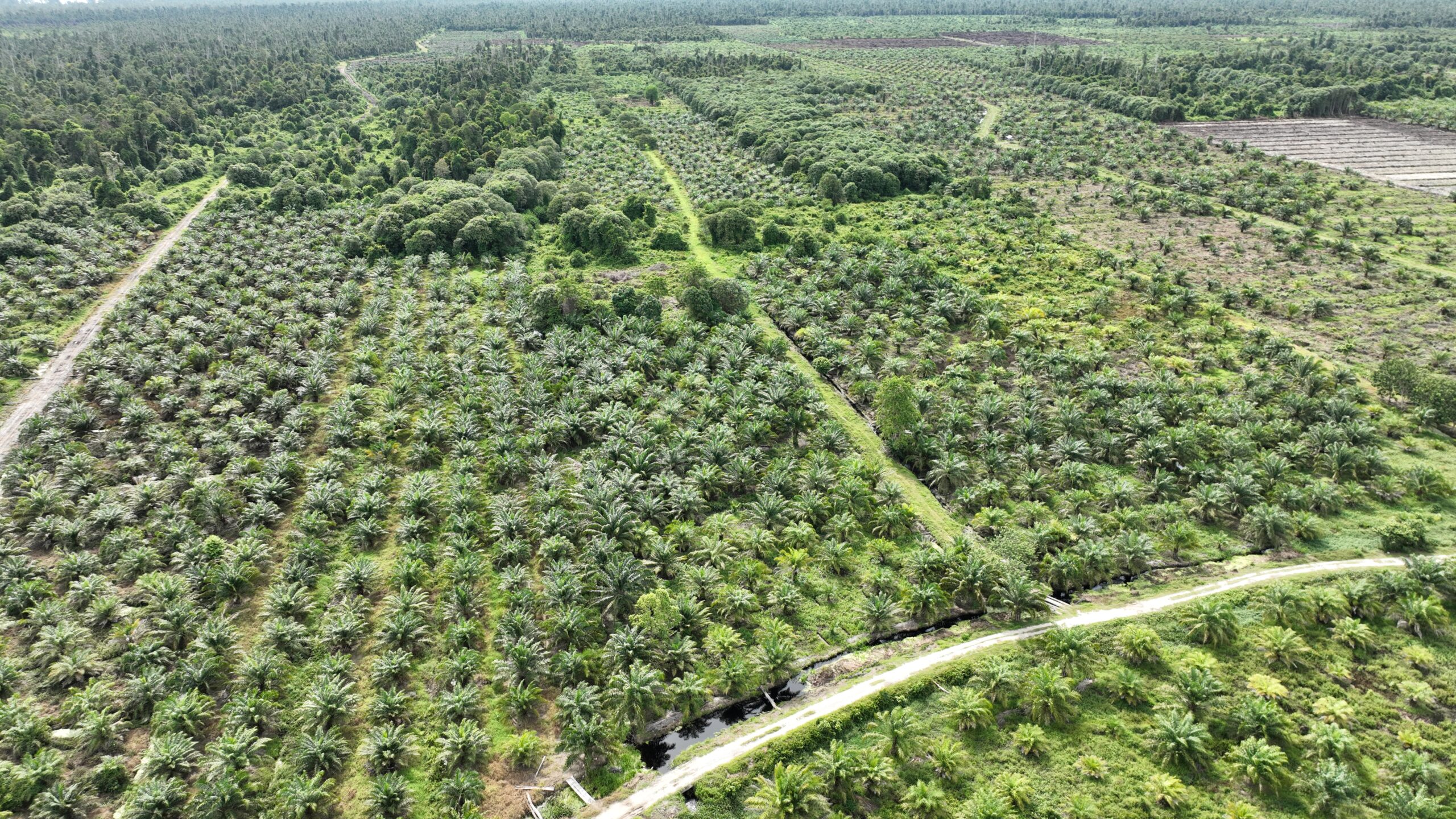Rogue palm oil companies PT. SPS and PT. Kallista Alam refuse to obey court orders after illegally clearing critical peatlands
Two notorious palm oil producers known to operate in Sumatra’s Leuser Ecosystem continue to refuse to pay their court ordered fines or take other legally required steps to restore the degraded areas they are responsible for. Convicted of illegally and intentionally using fire to clear critical habitat within the globally important lowland forests and peatlands of the Leuser, both PT. SPS and PT. Kallista Alam (KA) have waged fierce, years-long battles against officials to avoid paying the fines they owe and taking the steps needed to remediate the damage they have caused. To this day, both PT. SPS and PT. KA are profiting from their palm oil plantations even as they stubbornly refuse to pay compensation or restore areas they are convicted of burning.
Palm oil expansion has devastated Aceh’s peatlands within the world-renowned Leuser Ecosystem for decades. One of Aceh’s three major peatlands is located in an area called Tripa, which once contained over 150,734 acres of lowland forests with over 128,495 acres composed of carbon rich peatlands. Since 2000, over almost 50,000 acres of land within Tripa has been converted to oil palm plantations due to the growing global demand for palm oil. The area of forested peatlands has been reduced to 18,671 acres of fragmented, but important, patches of peat forests. Thousands of hectares of these last peat forests remain within palm oil concessions allocated to companies by the government of Indonesia.
Located in the districts of Nagan Raya and Aceh Barat Daya, the Tripa peatland is an important ecosystem that regulates the freshwater cycle and floods, has been a resilient buffer zone from tsunami disaster, a vital source of livelihoods and sustenance for local communities, and is a valuable carbon store with peat domes of more than 5 meters depth. The Tripa peatland was once known as the “orangutan capital of the world” but due to the decimation of the forests due to oil palm expansion the local population of Sumatran orangutans has been tragically reduced. More than 4% of the known population of this critically endangered species were once found in the Tripa Swamp. Despite the damage caused from decades of irresponsible palm oil production, Tripa peatland remains an important landscape for the protection and restoration of peatlands in Aceh.
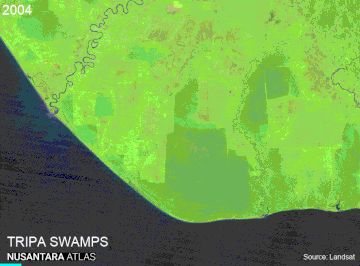
Time lapse footage of Tripa peatland. Nusantara Atlas.
This is why in October 2022, RAN conducted a field investigation to document active destruction of forests and drainage of peatlands within the concession of PT. Surya Panen Subur (PT. SPS) II and to determine which refineries were sourcing Conflict Palm Oil from two controversial palm oil companies–– PT. SPS II and PT. Kallista Alam.
RAN found that forest clearing continued in the last intact peat forests within PT. SPS II’s concession for the establishment of palm oil plantations and that a new palm oil trader–– PT. Inno-Wangsa Oils & Fat of the Tanimas Group–– was responsible for selling Conflict Palm Oil from Tripa to global markets. Urgent action needs to be taken by major brands to halt sourcing from the Tanimas Group, effective immediately. If a brand is not currently sourcing from the group, then it must place it on a ‘No Buy’ list until it adopts a No Deforestation, No Peatland and No Exploitation (NDPE) policy and stops sourcing from companies that have destroyed the Tripa Peatland. Brands and traders must also work together with governments and communities to stop further palm oil expansion into all three peatlands in the Leuser Ecosystem, to protect remaining peat forests and restore degraded peatlands with existing palm oil concessions, and to resolve longstanding land conflicts with communities.
Who is responsible for the destruction of the Tripa Peatland?
The destruction of the Tripa peatland has been driven by a handful of palm oil companies––PT. Surya Panen Subur II, PT. Kallista Alam, PT. Cemerlang Abadi, PT. Dua Perkasa Lestari, PT. Gelora Sawita Makmur, Socfin Indonesia ( Block Seumanyam), PT. Patriot Guna Sakti Abadi II and a network of mills and refineries that have sourced from these companies over the past decade of destruction. Most of these companies have been exposed for violating NDPE policies of major brands since RAN launched its investigation program in the Leuser Ecosystem in 2013. PT. Surya Panen Subur (PT. SPS) II and PT. Kallista Alam are two of the most notorious companies as they have also been repeatedly exposed by RAN for deforestation, a failure to resolve conflicts with local communities, and have been taken to court by the government of Indonesia for illegally burning peat forests––an action that contributed to an fire-fueled inferno in 2011 and 2012 that captured the world’s attention. PT. Cemerlang Abadi has been subject to recent controversy due to its new development on peatlands and refusal to accept decisions made by the government to return part of its lands to the community that has customary rights over the lands it has developed into a palm oil plantation.
Which brands and traders have, or are, sourcing from companies complicit in the destruction of the Tripa Peatland?
Major brands PepsiCo, Mondelēz, Unilever, Procter & Gamble, Nestlé, Mars and Colgate Palmolive have been exposed for sourcing palm oil from these companies with operations in the Tripa Peatland––including PT. SPS II. Unilever, Procter & Gamble and Nestlé claim to have suspended sourcing from PT. SPS II and PT. Kallista Alam. Nestlé’s forest footprint for Aceh states that almost 20,000 acres of peatland exists within unverified sourcing boundaries linked to mills in its supply chain and has called for more accurate peatland information, including status of peatland mapping, moratorium areas inside and outside concessions, and plans for restoration or rezoning of lands in ‘Another Utilization Area’ (APL). PepsiCo, and others, have failed to respond publicly to the PT. SPS II case for over 4 years.
Golden Agri Resources ––one of the major traders that supply palm oil to these brands that has been repeatedly exposed for sourcing from rogue actors in Tripa also claims to have stopped sourcing from PT. SPS II and PT. Kallista Alam. In 2022, GAR responded to RAN’s recent report on deforestation and new peatland development within PT. SPS II’s concession and ‘committed to conducting a traceability assessment through a desktop study and a field visit if necessary to ensure no FFB from SPS II’s concession (especially in the encroachment area) enters GAR’s supply chain.’ GAR has not yet published the results of this effort. Another palm oil trader, Permata Hijau also claims to have suspended sourcing from PT. SPS II and PT. Kallista Alam as it was caught sourcing from them in 2020, long after they had been suspended from other traders supply chains. Wilmar claims to have stopped sourcing from PT. SPS II in 2018 but fails to list a grievance on PT. Kallista Alam. Musim Mas also claims to have stopped sourcing from PT. SPS II and PT. KA Apical claims to have suspended sourcing from PT. Cemerlang Abadi but has no grievances listed for PT. SPS II and PT. Kallista Alam.
Deforestation persists in Tripa Peatland but is driven by other actors inside PT. SPS II’s concession. A new trader––PT. Inno-Wangsa Oils & Fat ––is profiting from sourcing Conflict Palm Oil
In October 2022, RAN conducted a field investigation to document ongoing destruction of peatlands within the concession of PT. Surya Panen Subur II and to determine which refineries were sourcing Conflict Palm Oil from PT. SPS II and PT. Kallista Alam. We found that forest clearing continued in the last intact peat forests within PT. SPS II’s concession for the establishment of palm oil plantations. The land clearing was within the permit area for PT. SPS II’s but was, according to interviews conducted, being carried out with the support of Mr Amat and Mr Nasir––the current and former head of the Kuala Seumayam village, Camat Darul Makmur Tawaruddin S. Sos– the head of the sub-district Darul Makmur in Nagan Raya–– and Raja Sayang, a member of the Suara Independent Rakyat Aceh (SIRA) political party in Nagan Raya.
The palm oil produced by PT. SPS II was being sold to a new refinery located near the export port facilities in Medan, North Sumatra––a new rogue palm oil trader called PT. Inno-Wangsa Oils and Fats. RAN also secured evidence that the same refinery is sourcing from PT. Kallista Alam. PT. Inno-Wangsa Oils and Fat appears to be one of the main actors involved in selling Conflict Palm Oil produced at the expense of the Tripa Peatland to the global market. The company is part of the Tanimas Group, a palm oil processor and supplier of palm oil and soup products that has operated near the Leuser Ecosystem since 2002. The company also has operations in Malaysia that supply palm oil filled products to Africa, India, China, Korea, Indonesia, Papua New Guinea. The Tanimas Group lacks a “No Deforestation, No Peatland and No Exploitation” policy and appears to be a roadblock to the protection and restoration of the Tripa Peatland.
PT. Surya Panen Subur II––A track record of peat forest destruction, fires, and conflicts with communities, and refusal to pay fines.
PT. Surya Panen Subur II is one of the most controversial palm oil companies in Aceh and was embroiled in the fires that captured the world’s attention in 2011 and 2012. A vast area of Tripa’s peatland was allocated to PT. SPS II, and to date it remains the largest remaining stretch of peat forests within a palm oil concession in the area. The protection and restoration of these peat forests which stretch over almost 10,000 acres has been a priority for local conservation organizations for over a decade. PT. SPS II has also been the subject of a long standing conflict with local communities from the Kuala Semanyam village.
The images below show the scale of ongoing destruction of peatlands for new palm oil plantations within the concession of PT. SPS II. Based on interviews conducted in the field, we believe the land clearing within the permit area for PT. SPS II’s was being carried out with the support of Mr Amat and Mr Nasir — the current and former head of the Kuala Seumayam village, Camat Darul Makmur Tawaruddin S. Sos — who is the head of the sub-district Darul Makmur in Nagan Raya–– and Raja Sayang, a member of the Suara Independent Rakyat Aceh political party in Nagan Raya. Community members have shared that PT. SPS II appears to have abandoned the forested peatlands within its concession area. The draining and clearing of the remaining peat forests has resumed with the support of these influential local actors––some say in order to reclaim lands for oil palm development and to ensure that PT. SPS II––or any other company––doesn’t take control of community lands.
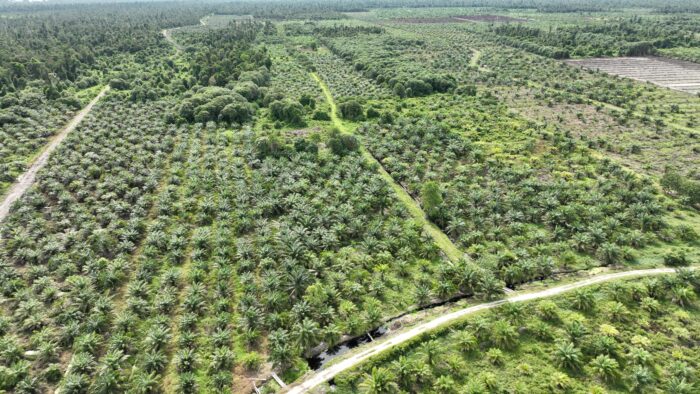
GPS Coordinates:03º45’48.95″N 96º36’32.09″E
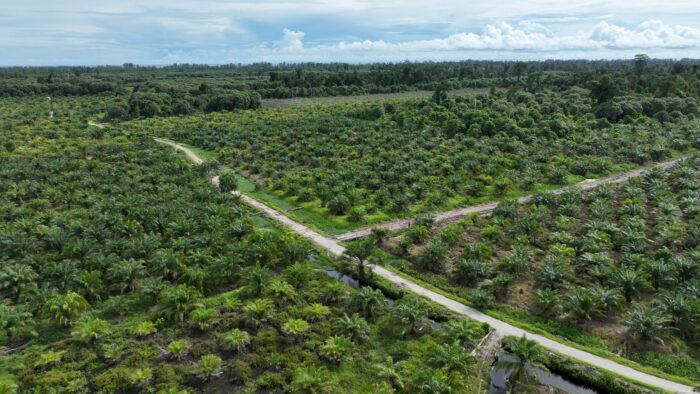
GPS Coordinates: 03º45’48.95″N 96º36’32.10″E
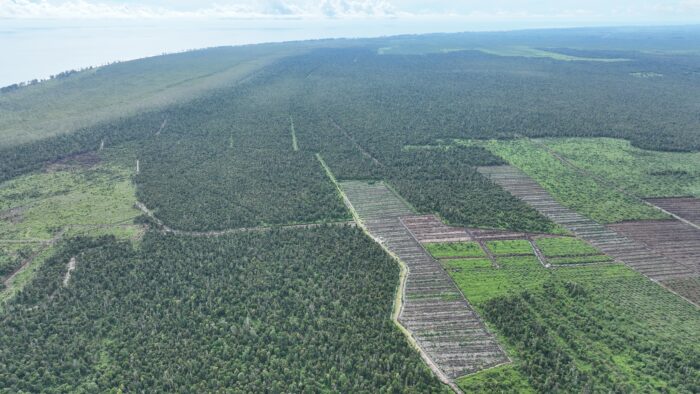
There is a long history of land conflict in Kuala Semanyam because community members were forced from their customary lands when PT. SPS II first took control of the lands within the concession area allocated by the Indonesian government. Local communities have been impacted by the lack of recognition of their customary land rights, unfair negotiations for land compensation, intimidation, and noise and environmental pollution resulting from palm oil effluent and transportation. RAN and other local civil society organizations have documented this land conflict and in the past have called for PT SPS II and other supply chain actors to ensure the establishment of a credible conflict resolution process aided by an independent and competent mediator. It remains a priority to identify and resolve land conflicts in the Tripa peatland. Only once land conflicts are resolved, can efforts to protect and restore Tripa’s peat forests and to secure alternative livelihoods for impacted communities be successful.
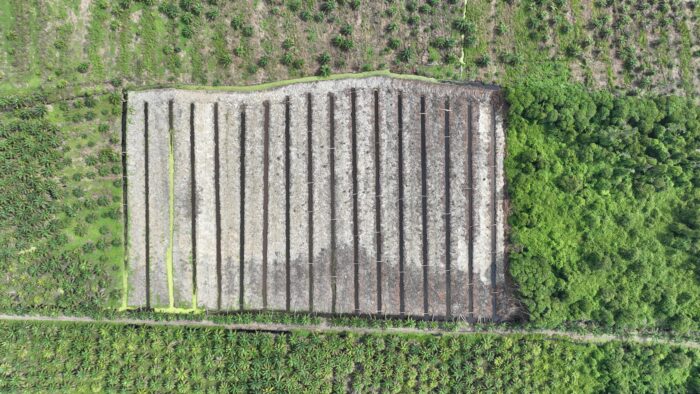
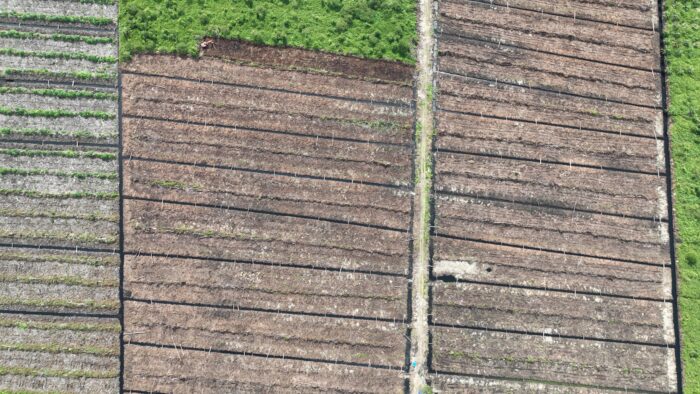
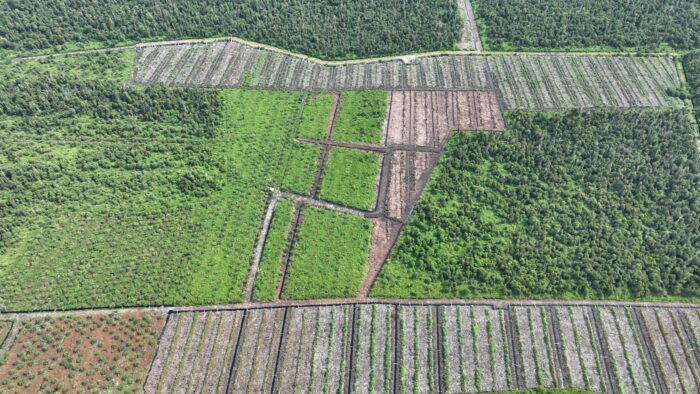
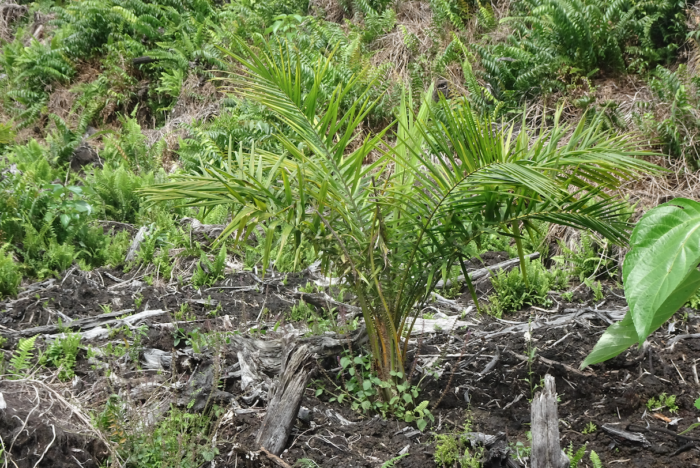
New plantings of oil palm on cleared peatlands within PT. SPS II’s concession. October 2022 GPS Coordinates: 03º45’24.89″N 96º35’23.00″E
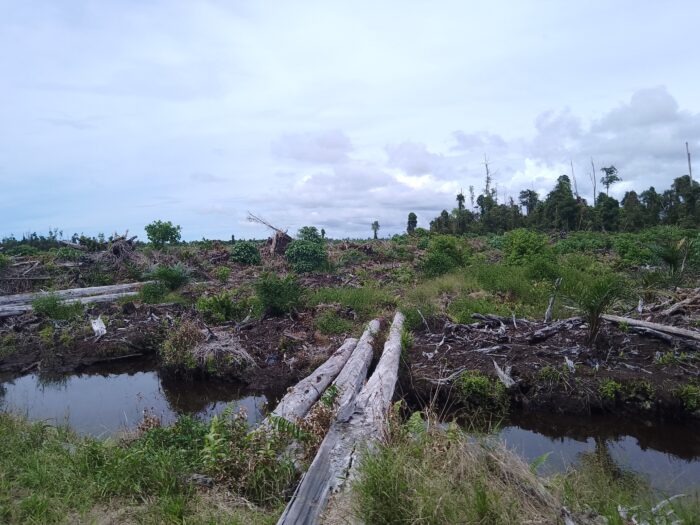
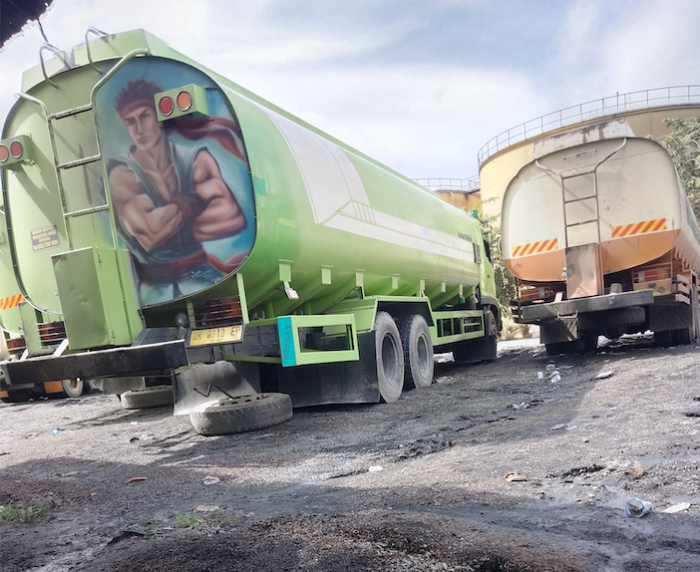
CPO truck transporting palm oil from PT. SPS II’s mill. Kuala Seumanyam, Darul Makmur, Nagan Raya. GPS Coordinates: 03º48’27.27″N 96º29’36.72″E
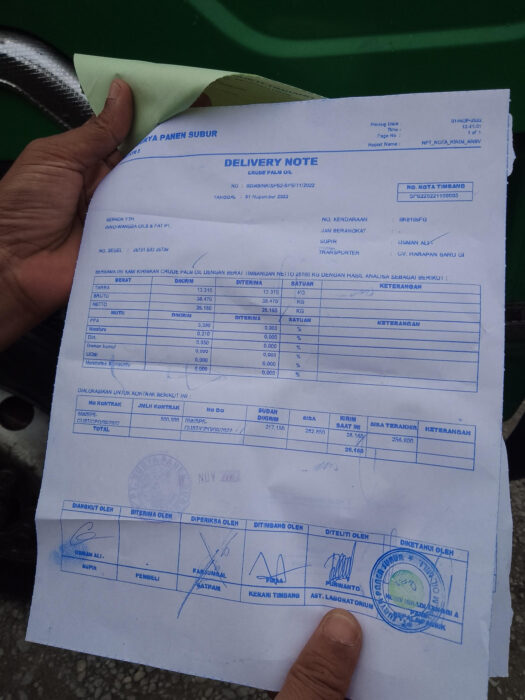
Delivery note for crude palm oil from PT. SPS II’s mill to Inno-wangsa Oils & Fat Pty Ltd via CV Harapan Baru.
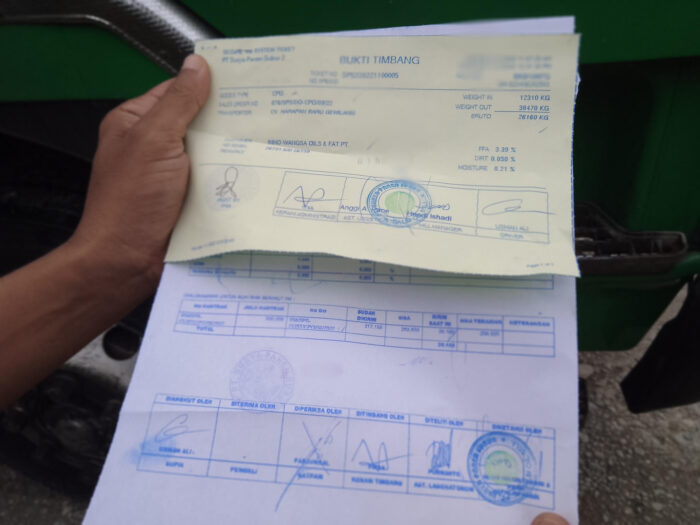
Delivery note for crude palm oil from PT. SPS II’s mill to Inno-wangsa Oils & Fat Pty Ltd via CV Harapan Baru.
The destruction of peat forests within PT. SPS II’s concession started to spike again in January 2022, and clearing continued throughout the year. The forest loss map below shows the area of peat forests that were being cleared within PT. SPS II’s concession in November 2022. The satellite image shows the further 11.7 acres were cleared in December 2022. There were 10,737 acres of peat forests remaining in its concession in April 2016 when RAN started to actively monitor palm oil development within the concession each month. The area of remaining peat forests has been reduced to 8,874 acres under the watch of major traders, brands and the government of Indonesia. A total of 870 acres of peat forests have been cleared by PT. SPS II and other actors within this concession since the government of Indonesia declared a moratorium on forest clearance for palm oil plantations was declared in Indonesia in January 2018.
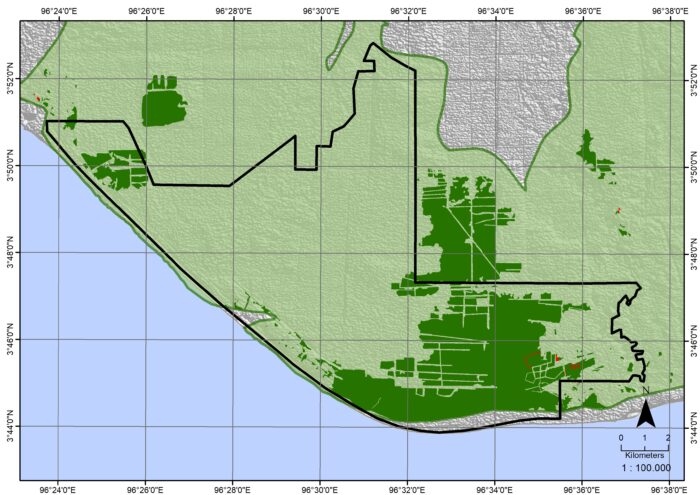
Map showing the remaining peats forests within PT. SPS II palm oil concession that require immediate protection. Red lines show new drainage of peatlands and development of oil palms. November 2022
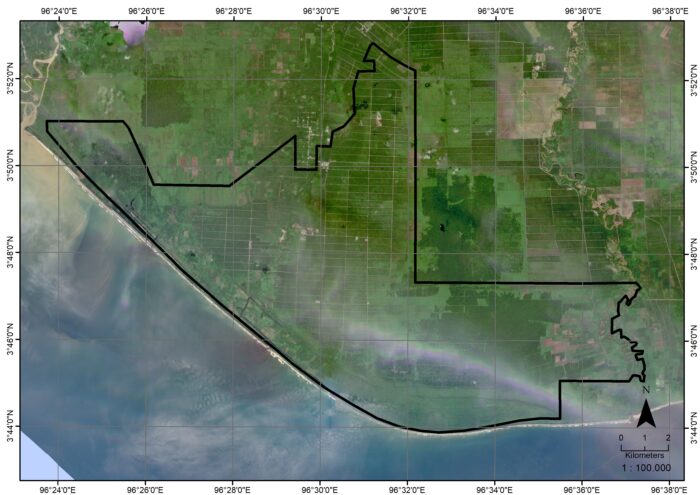
The Planet satellite image shows the further 11.7 acres were cleared in December 2022.
The Indonesian government has taken PT. SPS II to court for the intentional and illegal use of fires. The lawsuit was filed by the Minister of Environment and Forestry in the courts in Jakarta in 2013 and presented reports, data, and field verification reports showing 2965 acres of fires had occurred within PT. SPS’s concession plantation area. The Ministry argued that PT. SPS II deliberately allowed fires on its plantation land which is peatland of a depth that is protected by law. The lawsuit also presented that PT. SPS also did not prevent and deal with fires once ignited.
A series of court appeal and cessation efforts followed in the district court followed by the Ministry of Environment and Forestry submitting a judicial review to the Supreme Court. The Supreme Court canceled the previous court decisions, stating that PT. SPS had committed an unlawful act and sentenced PT. SPS to pay compensation of 136 billion Indonesian Rupiah and to carry out recovery actions at a cost of 302 billion rupiah. The court prohibited PT. SPS II from planting palm oil on the 2965 acres of peatland which had been burned. A criminal case in the district court in Aceh, which was strengthened via a judicial review, found three PT. SPS II company representatives guilty of committing a crime and sentenced them to two years in prison and a fine of 3 billion rupiah. In 2018, one of the defendants who was the Head of the Plantation was detained. There have been no recent reports on detainment of the other two defendants.
To this day, PT. SPS II operates its palm oil concession and has not paid compensation and recovery costs or restored burned areas of peatlands. The failure to implement the actions defined by the courts is one of the reasons why PT. SPS II has been removed from the supply chains of major traders and brands.
The extent of the fires evident during the 2011 and 2012 period can be seen in the map below.
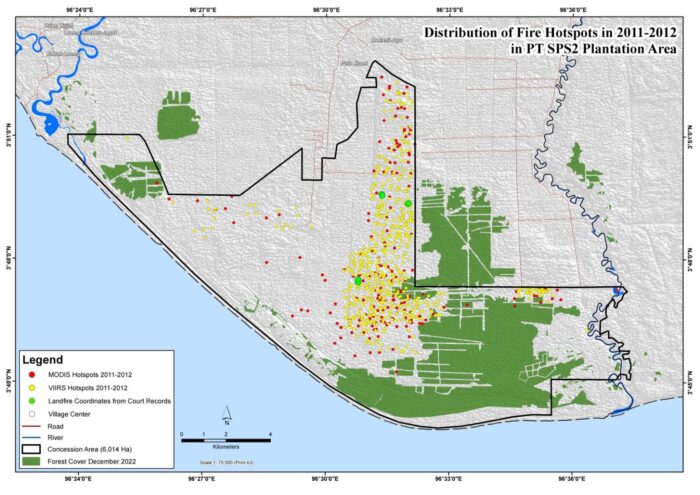
A map showing the fire hotspots within PT. SPS II’s concession in 2011 and 2012
PT. Kallista Alam–– A track record of fires, peat forest destruction and refusal to pay fines
PT. Kallista Alam is another controversial palm oil company that is responsible for the destruction of the Tripa peatland. The company is most notorious for burning vast areas of peat forests to establish its palm oil plantations, and for employing tactics to avoid the execution of the court’s verdicts that resulted from it being found guilty for violating Indonesia’s laws that prohibit the use of fire to clear peat forests for palm oil. PT. Kallista Alam continues to produce and process palm oil in its own crude palm oil mill and has been found by RAN’s investigators to supply its Conflict Palm Oil to PT. Inno-Wangsa Oils and Fat. PT. Inno-Wangsa Oils and Fat is not only sourcing palm oil that is responsible for the destruction of the Tripa Peatland it is helping the rogue company to profit whilst defying Indonesia’s laws and court verdicts.

CPO truck transporting palm oil from PT. Kallista Alam’s mill. Pulo Kruet, Darul Makmur, Nagan Raya.
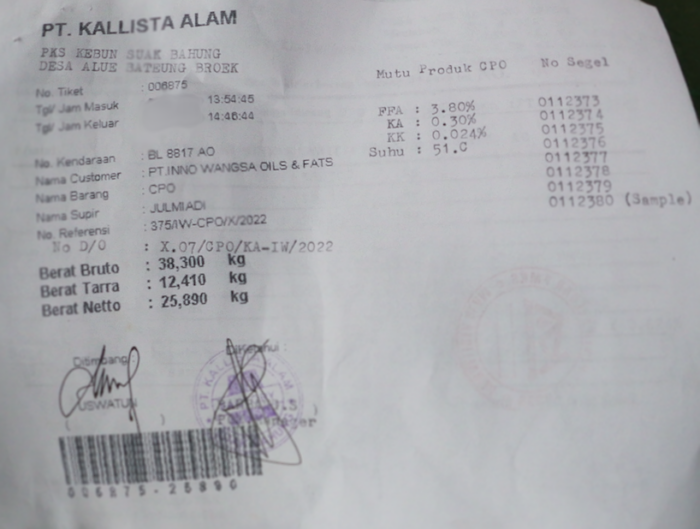
Delivery note for crude palm oil from PT. Kallista Alam mill to Inno-Wangsa Oils & Fat Pty Ltd via Julmiadi
PT. Kallista Alam has waged a stubborn, years long campaign to evade its legal responsibility and avoid paying its legally mandated environmental restoration costs for burning Tripa’s irreplaceable peatlands
In January 2014, the Meulaboh District Court issued a decision that declared PT. Kallista Allam guilty of violating Indonesia’s laws through the intentional use of fire to clear peat forests within its concession. The verdict included an order that the 14,256 acres of PT. KA’s palm oil concession (HGU Certificate N0. 27) would be confiscated if it failed to pay a fine of 114,303,419,000.00 rupiah to the state treasury and 251,765,250,000.00 rupiah to pay for land restoration. The court also issued a requirement to not plant oil palm on the land that has been burned and a fine of 5,000,000 rupiah would be charged for each day PT KA does not pay the fines.
Since then, a series of lawsuits have been allegedly set up by PT. Kallista Alam designed to slow down the process of executing the verdict which would result in its payment of the fines and the restoration of the peatland areas that had been burned. In October 2020, PT. KA filed a third lawsuit to try to cancel the previous court decision. This case was rejected by a panel of judges. PT. KA filed an appeal in February 2021 which upheld and strengthened the decision of the judges in October 2020. In June 2021, PT KA sent a cassation request, but until now there has been no cassation decision from the Supreme Court. Additional lawsuits have been filed by various parties that aimed to postpone the conviction of PT KA have also been decided by the court that the lawsuits are unacceptable (niet onvantkelijk).
Due to the outcomes from the most recent cases in 2020 and 2021, there are no more legal remedies that PT. KA can take to avoid implementation of the decision of the first court case (12/Pdt.G/PN.Mbo) which requires the company to pay the compensation and environmental restoration costs. However, a major challenge faced by the government of Indonesia has been its inability to undertake the appraisal process. The appraisal team from the Ministry of Environment and Forestry attempted to visit PT. KA’s plantation land twice in 2019 and 2020 but was intercepted by the company’s security and people the company apparently deployed to block the appraisal team’s access to the plantation areas that were the subject of the legal cases.
The extent of the fires inside PT. Kallista Alam’s concession during 2011 and 2012 can be seen in the map below.
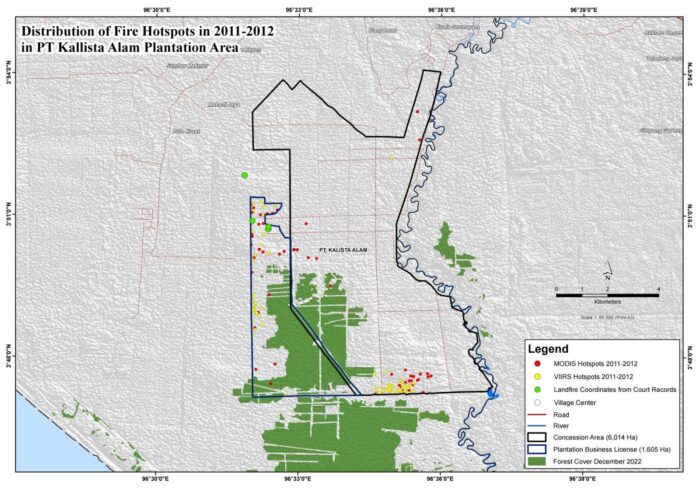
A map showing the fire hotspots within PT. Kallista Alam’s concession in 2011 and 2012
There were 1,179 acres of peat forests remaining in PT. Kallista Alam’s concession in January 2018 when the government of Indonesia declared a moratorium on forest clearance for palm oil plantations.The area of remaining peat forests has been reduced to 1,114 acres under the watch of major traders, brands and the government of Indonesia. A total of 64 acres of peat forests have been cleared since the declared palm oil expansion moratorium came into effect. The satellite image and forest loss map below show the extent of peat forests remaining within one of the two concessions in November 2022.
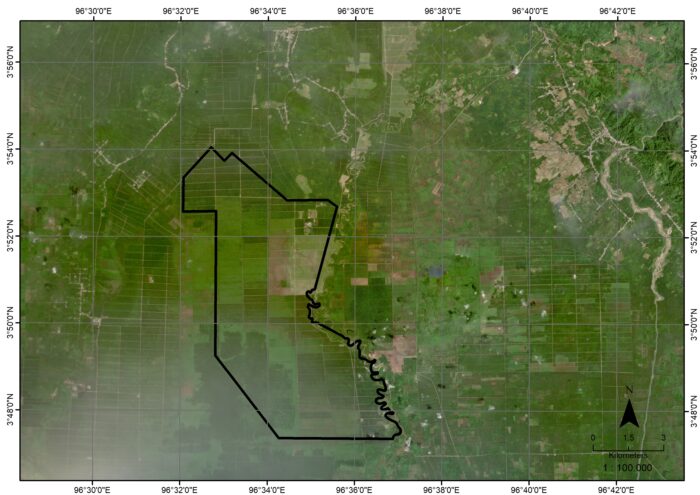
The satellite image shows the extent of peat forests remaining within one of PT. Kallista Alam’s concessions in November 2022.
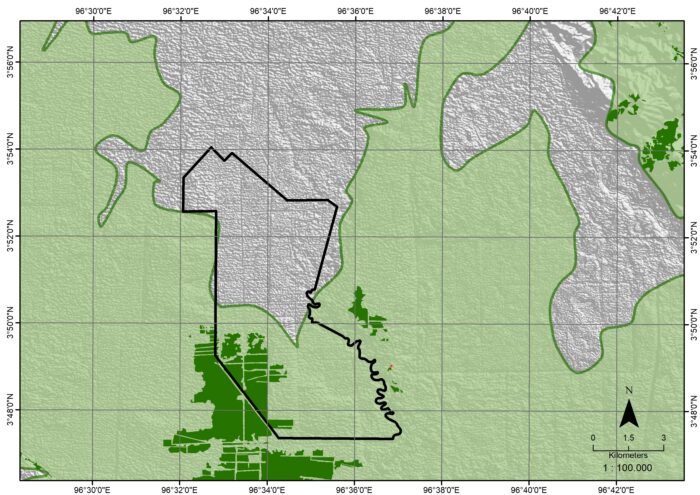
The forest loss map shows the extent of peat forests remaining within one of PT. Kallista Alam’s concessions in November 2022.
The title of ‘Orangutan Capital of the World’ is now used when referring to the neighboring Singkil and Kluet peatlands in the Singkil-Bengkung region–– home to two of the last largely intact peat forests in Aceh that are home to the highest density of remaining Sumatran Orangutans on the planet. The Singkil and Kluet peatlands in the Singkil-Bengkung region are facing an onslaught of illegal deforestation and palm oil expansion within the Leuser Ecosystem. The tragic and preventable destruction of the Tripa Swamp is a cautionary tale that must be reversed where possible and must not be allowed to be repeated in the Singkil and Kluet regions.
These extraordinary forests are the last line of defense against extinction for wilflife species found nowhere else, and the vast amount of carbon stored in these intact landscapes is a threat to everyone across the world. The stakes are simply too high for major traders and brands to continue with half measures or unfulfilled promises. With the world watching, this special region is now a litmus test for how serious these companies are about living up to the commitments they have already made, so it is imperative we all keep up the pressure and hold them to account.
